
What can you do?
Together we can take action to stop this escalating environmental catastrophe and protect fisheries for the future.
Recommendations

Consumers
- Diversify consumption of seafood to include fewer species reliant on feed containing FMFO – especially carnivorous farmed species, such as salmon and prawns. Through their purchasing decisions, consumers have an opportunity to send a clear message to the industry that they care about the impacts reduction fisheries have on people and the environment. They can do so by opting for species not cultivated using FMFO and reducing consumption of unsustainable farmed seafood products
- Show companies that they care by contacting retailers and seafood farmers and spreading the word.

Retailers
- Provide full transparency about farmed seafood supply chains – from the identity of their suppliers and processors, to aquafeed companies, fishmeal and fish oil (FMFO) producers, and the location of reduction fisheries.
- Commit to avoiding seafood reliant on FMFO inputs from whole wild-caught fish. Retailers should put in place a roadmap for eliminating the use of FMFO in their products, and conduct regular audits to ensure this is being implemented.

Certification Schemes
- Reduction fisheries should not be certified. Certifying reduction fisheries gives a false impression that exploiting wild-caught fish for use in fishmeal and fish oil (FMFO) can be sustainable.
- Wild-caught fisheries certification schemes, such as the Marine Stewardship Council, should stop certifying fish that is not used for direct human consumption, while aquaculture certification schemes should only certify farmed fish not reliant on the use of FMFO from whole wild-caught fish.

Aquafeed Industry
- Switch from using wild-caught fish for feed to more sustainable alternatives. While some companies are taking initial steps towards reducing their reliance on fish in a selection of their aquafeed products, the use of fishmeal and fish oil (FMFO) needs to be phased out across the entire industry for transformational change to take place. Companies should also stop using FMFO to feed other animals, such as pigs, chickens and mink.
- Ensure alternative feed sources do not give rise to other social and ecological problems. It is critical that the industry understands and minimises negative impacts linked to other sources of feed; for example, there are huge environmental and social problems linked with expansion of soybean and palm-oil production, which are currently not sufficiently addressed by any existing sustainability initiatives.

Fish Farming
- The industry should prioritise cultivating species that do not require feed (e.g. shellfish), that require fewer inputs (e.g. tilapia) or that can be fed an entirely vegetarian diet (e.g. carp).
- For species that require feed, it should push aquafeed producers to provide genuinely sustainable alternatives to aquafeed containing FMFO. The aquaculture industry must be willing to share the additional cost that sustainable alternatives may entail.

Policymakers
- Implement stricter regulations on due diligence and transparency in aquafeed supply chains. Governments and policymakers should strengthen governance frameworks to eliminate illegal, unregulated and unreported fishing and slave labour, prevent overfishing, and enhance transparency and reporting in global fisheries supply chains.
- Develop guidelines for sustainable feed ingredients. Policy should support the development of alternative feed industries and provide incentives for a transition to more sustainable ingredients. Policymakers should encourage a range of alternatives to whole wild-caught fish that do not result in the destruction of natural habitats and ecosystems, as well as other innovative and truly responsible approaches.
- Governments should support the phase-out of whole wild-caught fish for use in aquafeed. Furthermore, aquaculture that relies on wild-caught fish should not receive any subsidies or other public support measures.
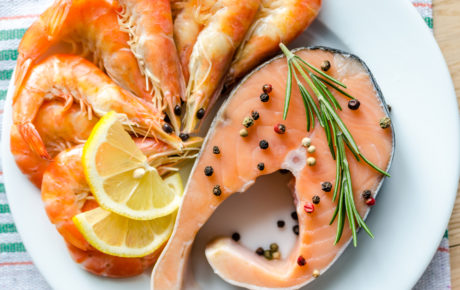
- Diversify consumption of seafood to include fewer species reliant on feed containing FMFO – especially carnivorous farmed species, such as salmon and prawns. Through their purchasing decisions, consumers have an opportunity to send a clear message to the industry that they care about the impacts reduction fisheries have on people and the environment. They can do so by opting for species not cultivated using FMFO and reducing consumption of unsustainable farmed seafood products
- Show companies that they care by contacting retailers and seafood farmers and spreading the word.
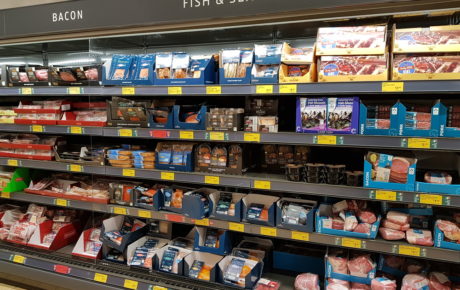
- Provide full transparency about farmed seafood supply chains – from the identity of their suppliers and processors, to aquafeed companies, fishmeal and fish oil (FMFO) producers, and the location of reduction fisheries.
- Commit to avoiding seafood reliant on FMFO inputs from whole wild-caught fish. Retailers should put in place a roadmap for eliminating the use of FMFO in their products, and conduct regular audits to ensure this is being implemented.
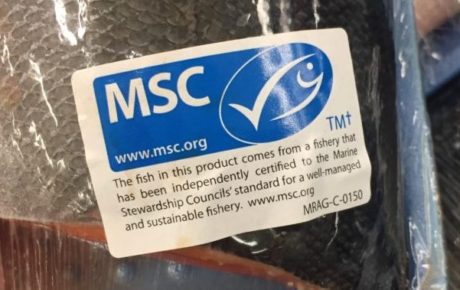
- Reduction fisheries should not be certified. Certifying reduction fisheries gives a false impression that exploiting wild-caught fish for use in fishmeal and fish oil (FMFO) can be sustainable.
- Wild-caught fisheries certification schemes, such as the Marine Stewardship Council, should stop certifying fish that is not used for direct human consumption, while aquaculture certification schemes should only certify farmed fish not reliant on the use of FMFO from whole wild-caught fish.
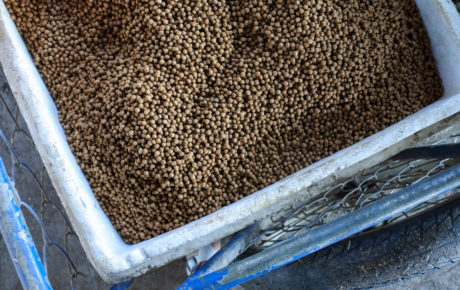
- Switch from using wild-caught fish for feed to more sustainable alternatives. While some companies are taking initial steps towards reducing their reliance on fish in a selection of their aquafeed products, the use of fishmeal and fish oil (FMFO) needs to be phased out across the entire industry for transformational change to take place. Companies should also stop using FMFO to feed other animals, such as pigs, chickens and mink.
- Ensure alternative feed sources do not give rise to other social and ecological problems. It is critical that the industry understands and minimises negative impacts linked to other sources of feed; for example, there are huge environmental and social problems linked with expansion of soybean and palm-oil production, which are currently not sufficiently addressed by any existing sustainability initiatives.
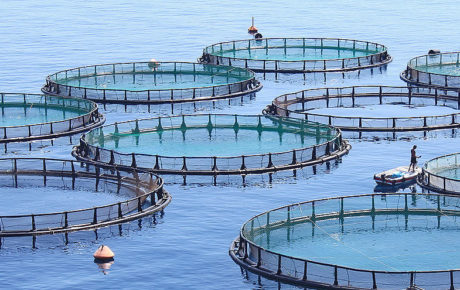
- The industry should prioritise cultivating species that do not require feed (e.g. shellfish), that require fewer inputs (e.g. tilapia) or that can be fed an entirely vegetarian diet (e.g. carp).
- For species that require feed, it should push aquafeed producers to provide genuinely sustainable alternatives to aquafeed containing FMFO. The aquaculture industry must be willing to share the additional cost that sustainable alternatives may entail.
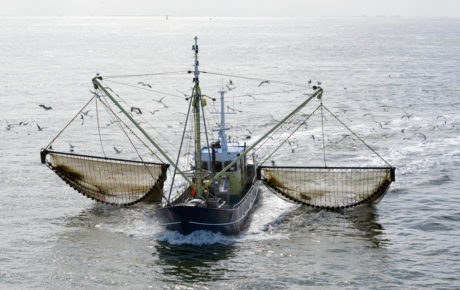
- Implement stricter regulations on due diligence and transparency in aquafeed supply chains. Governments and policymakers should strengthen governance frameworks to eliminate illegal, unregulated and unreported fishing and slave labour, prevent overfishing, and enhance transparency and reporting in global fisheries supply chains.
- Develop guidelines for sustainable feed ingredients. Policy should support the development of alternative feed industries and provide incentives for a transition to more sustainable ingredients. Policymakers should encourage a range of alternatives to whole wild-caught fish that do not result in the destruction of natural habitats and ecosystems, as well as other innovative and truly responsible approaches.
- Governments should support the phase-out of whole wild-caught fish for use in aquafeed. Furthermore, aquaculture that relies on wild-caught fish should not receive any subsidies or other public support measures.












